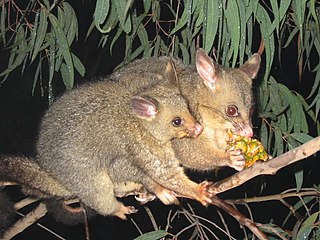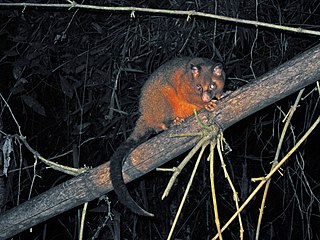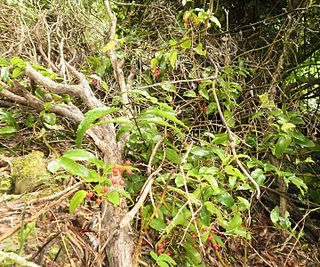Related Research Articles

Phalangeriformes is a paraphyletic suborder of about 70 species of small to medium-sized arboreal marsupials native to Australia, New Guinea, and Sulawesi. The species are commonly known as possums, gliders, and cuscus. The common name "possum" for various Phalangeriformes species derives from the creatures' resemblance to the opossums of the Americas. However, although opossums are also marsupials, Australasian possums are more closely related to other Australasian marsupials such as kangaroos.

The common brushtail possum is a nocturnal, semiarboreal marsupial of the family Phalangeridae, native to Australia and invasive in New Zealand, and the second-largest of the possums.

Mycobacterium bovis is a slow-growing aerobic bacterium and the causative agent of tuberculosis in cattle. It is related to Mycobacterium tuberculosis, the bacterium which causes tuberculosis in humans. M. bovis can jump the species barrier and cause tuberculosis-like infection in humans and other mammals.
Possum may refer to:

Poison shyness, also called conditioned food aversion, is the avoidance of a toxic substance by an animal that has previously ingested that substance. Animals learn an association between stimulus characteristics, usually the taste or odor, of a toxic substance and the illness it produces; this allows them to detect and avoid the substance. Poison shyness occurs as an evolutionary adaptation in many animals, most prominently in generalists that feed on many different materials. It is often called bait shyness when it occurs during attempts at pest control of insects and animals. If the pest ingests the poison bait at sublethal doses, it typically detects and avoids the bait, rendering the bait ineffective.

The scaly-tailed possum is found in northwestern Australia, where it is restricted to the Kimberley.

The greater gliders are three species of large gliding marsupials in the genus Petauroides, all of which are found in eastern Australia. Until 2020 they were considered to be one species, Petauroides volans. In 2020 morphological and genetic differences, obtained using diversity arrays technology, showed there were three species subsumed under this one name. The two new species were named Petauroides armillatus and Petauroides minor.

The short-eared possum is a species of marsupial in the family Phalangeridae, endemic to Australia. Found north of Sydney, New South Wales, on Australia’s eastern coast, the species was once classed under the mountain brushtail possum, its closest relative.

The brushtail possums are the members of the genus Trichosurus in the Phalangeridae, a family of marsupials. They are native to Australia and some small nearby islands. Unique among marsupials, they have shifted the hypaxial muscles from the epipubic to the pelvis, much like in placental muscles, meaning that their breathing cycle is more similar to the latter than to that of other non-eutherian mammals. In general, they are more terrestrially oriented than other possums, and in some ways might parallel primates.

The mountain brushtail possum, or southern bobuck, is a nocturnal, semi-arboreal marsupial of the family Phalangeridae native to southeastern Australia. It was not described as a separate species until 2002.

The Phalangeridae are a family of mostly nocturnal marsupials native to Australia, New Guinea, and Eastern Indonesia, including the cuscuses, brushtail possums, and their close relatives. Considered a type of possum, most species are arboreal, and they inhabit a wide range of forest habitats from alpine woodland to eucalypt forest and tropical jungle. Many species have been introduced to various non-native habitats by humans for thousands of years.

The northern brushtail possum is a nocturnal marsupial inhabiting northern Australia. The northern brushtail possum is sometimes considered a species; however, more often than not is considered a subspecies of the common brushtail possum.

The common brushtail possum was introduced from Australia to New Zealand, where it has become invasive and a major agricultural and conservation pest.

The coppery brushtail possum is a species of marsupial possum in the family Phalangeridae. Coppery brushtails are found within the Atherton Tablelands area of Queensland, in northeastern Australia. These mammals inhabit rainforest ecosystems, living within the tree canopy. Though they have a restricted distribution, they are locally common. This population is often considered a subspecies of T. vulpecula.

Phaulacridium marginale is a small species of short-horned grasshopper in the family Acrididae. It is endemic to New Zealand where it is found in low elevation open habitat throughout North Island, South Island, Stewart Island and on many smaller islands.

Ripogonum scandens is a common rainforest vine endemic to New Zealand. The species was described by Johann Reinhold Forster, and Georg Forster in 1776. It has a conservation status of Not Threatened.
Janine Deakin is a professor at the University of Canberra and Executive Dean of the Faculty of Science and Technology. She is a geneticist with expertise in the areas of comparative genomics, epigenetics, genetic immunology and genome structure and regulation. A majority of her work has focused on the Australian marsupials and monotremes where her cytogenetic and molecular research on marsupial chromosomes and development of strategies to map genomes has provided important insight into the evolution of mammalian genomes.

Priscilla M. Wehi is a New Zealand ethnobiologist and conservation biologist. As at July 2021 she is an associate professor at the University of Otago and on the first of that month officially undertook the role of director of Te Pūnaha Matatini, a centre of research excellence in complex systems and data analytics. During the COVID-19 pandemic in New Zealand Te Pūnaha Matatini scientists have developed mathematical models of the spread of the virus across the country that influence the New Zealand government's response to the outbreak. In 2021 Wehi was awarded the Hill Tinsley Medal.

Jennifer Faith Weston is a New Zealand veterinary scientist, and as of 2023 is a full professor at Massey University, specialising in dairy animals and their diseases.
References
- ↑ Goss, Helen (4 August 1995). "The mysterious case of the wobbly possum". New Scientist. Retrieved 11 December 2021.
- 1 2 Mackintosh, C.G.; Crawford, J.L.; Thompson, E.G.; McLeod, B.J.; Gill, J.M.; O'Keefe, J.S. (6 January 1995). "A newly discovered disease of the brushtail possum: Wobbly possum syndrome". New Zealand Veterinary Journal. 43 (3). Informa UK Limited: 126. doi:10.1080/00480169.1995.35869. ISSN 0048-0169. PMID 16031829.
- ↑ Dunowska, M.; Biggs, P.J.; Zheng, T.; Perrott, M.R. (2012). "Identification of a novel nidovirus associated with a neurological disease of the Australian brushtail possum (Trichosurus vulpecula)". Veterinary Microbiology. 156 (3–4). Elsevier BV: 418–424. doi:10.1016/j.vetmic.2011.11.013. ISSN 0378-1135. PMC 7117198 . PMID 22153843.